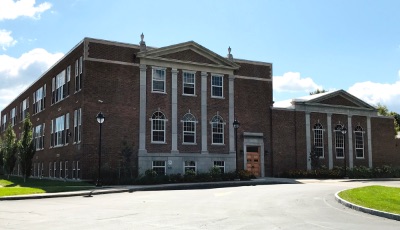7360 - Weapons in School and the Gun Free School Act
| Policy: Weapons in School and the Gun Free School Act | Policy Number: 7360 |
| Date of Original Policy: 07/10/2002 | Date Revision Adopted: 10/14/2020 |
| Reviewed by Policy Committee: 09/16/2020 | Date of Next Review: 02/24/2023 |
| Replacement of Policy Number: |
Weapons in School The possession of a weapon on school property, in District vehicles, in school buildings or at school sponsored activities or settings under the control and supervision of the District regardless of location, is strictly prohibited, except by law enforcement personnel. Any person possessing a weapon for educational purposes in any school building must have written authorization of the Superintendent of Schools or his or her designee.
The Penal code of the State of New York shall be used to determine what is considered a weapon.
Penal Law Sections 265.01-265.06
Specific Penalties Imposed by the Gun-Free Schools Act
No student shall bring or possess any “firearm” as defined in federal law on school premises (including school buildings and grounds, district vehicles, school settings or school sponsored activities under the control and supervision of the District regardless of location). For purposes of this policy, the term “firearm” includes any weapon (including a starter gun) which will or is designed to or may readily be converted to expel a projectile by the action of an explosive; the frame or receiver of such weapon; any firearm muffler or silencer; or any “destructive device” (e.g., any explosive, incendiary, or poison gas, including bombs, grenades, rockets or other similar devices). The term does not include a rifle which the owner intends to use solely for sporting, recreational or cultural purposes; antique firearms; or Class C. common fireworks.
In accordance with the Gun-Free Schools Act Section 3214(3)(d) of the Education Law, any student who brings or possesses a firearm, as defined in federal law, on school property, will be referred by the Superintendent to the appropriate agency or authority for a juvenile delinquency proceeding in accordance with Article 3 of the Family Court Act when the student is under the age of sixteen (16) except for a student fourteen (14) or fifteen (15) years of age who qualifies for juvenile offender status under the Criminal Procedure Law, and will be referred by the Superintendent to the appropriate law enforcement officials when the student is sixteen (16) years of age or older or when the student is fourteen (14) or fifteen (15) years of age and qualifies for juvenile offender status under the Criminal Procedure Law.
In addition, any student attending a district school who has been found guilty of bringing a firearm to or possessing a firearm on school property, after a hearing has been provided pursuant to Section 3214 of the Education Law, shall be suspended for a period of not less than one (1) calendar year and any student attending non-district school who participation in a program operated by the School District using funds form he Elementary and Secondary Education Act of 1965 who is determined to have brought a firearm to or possessed a firearm at a District school or on other premises used by the School District to provide such programs shall be suspended for a period of not less than one (1) calendar year from participation in such program. The procedures of education Law Section 3214(3) shall apply to such a suspension of a student attending a non-district school. Further, after the imposition of the one (1) year penalty has been determined, the Superintendent of Schools has the authority to modify the suspension requirement for each student on a case-by-case basis. In reviewing the student’s one (1) year suspension penalty, the Superintendent may modify the penalty based on factors as set forth in Section 100.2 of the Regulations of the Commissioner of Education and in Commissioner’s Decisions. The determination of the Superintendent shall be subject to review by the Board of Education in accordance with Education Law Section (3)(c ) and by the Commissioner of Education in accordance with Education Law Section 310.
Student with a Disability
A student with a disability who is determined to have brought a firearm to school or possessed a firearm at school may be placed in an interim alternative educational setting, in accordance with federal and state law, for not more than forty-five (45) calendar days. If the parent or guardian requests an impartial hearing, the student must remain in the interim alternative placement until the completion of all proceedings, unless the parent or guardian and district can agree on a different placement.
A student with a disability may be given a long term suspension pursuant to the Gun-Free Schools Act only if a group of persons knowledgeable about the student is defined in federal regulations implementing the IDEA, determines that the bringing of a firearm to school or possessing a firearm at school was not a manifestation of the student’s disability, subject to applicable procedural safeguards.
If it is determined that the student’s bringing of a firearm to school or possessing a firearm at school was a manifestation of the student’s disability, the Superintendent must exercise his or her authority under the Gun-Free Schools Act to modify the long term suspension requirement, and determine that the student may not be given a long term suspension for the behavior. The Committee on Special Education may review the student’s current educational placement and initiate change in placement proceedings, if appropriate, subject to applicable procedural safeguards.
The District may offer home instruction as an interim alternative educational setting during the pendency of review proceedings only if the student’s placement in a less restrictive alternative educational setting is substantially likely to result in injury either to the student or to others.
The District may also seek a court order to immediately remove a student with a disability from school if the District believes that maintaining the student in the current educational placement is substantially likely to result in injury to the student or to others.
Students with disabilities continue to be entitled to all rights enumerated in the Individuals with Disabilities Education Act and Article 89 of the Education Law; and this policy shall not be deemed to authorize suspension of students with disabilities in violation of these laws.
This policy does not prohibit the district from utilizing other disciplinary measures including, but not limited to, out-of –school suspension for a period of five (5) days or less, or in-school suspension, in responding to other types of student misconduct with infringe upon the established rules of the school. Additionally, this policy does not diminish the authority of the Board of Education to offer courses in instruction in the safe use of firearms pursuant to Education Law Section 809-a.
The District will continue to provide the suspended student who is of compulsory attendance age with appropriate alternative instruction during the period of the student’s suspension.
Gun-Free Schools Act as reauthorized by the No Child Left Behind Act of 2001
18 United States Code (USC) Section 921(a)
Individuals with Disabilities Education Act (IDEA)
20 United States Code (USC) Section 1400-1485 and 7151
Criminal Procedure Law Section 1.20(42)
Education Law Sections 310, 809-a, 3214 and Article 89
Family Court Act Article 3
8 New York Code of Rules and Regulations (NYCRR)Section 100.2 and Part 200




